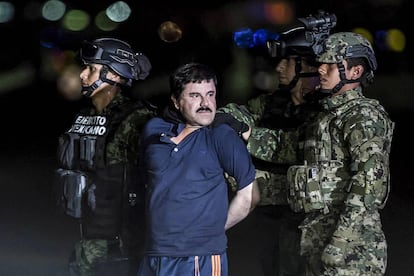The American ‘cage’ holding the world’s biggest drug lord
‘El Chapo’ Guzmán awaits trial in solitary confinement inside a New York City correctional facility
There is a television set in the room where Joaquín “El Chapo” Guzmán is allowed to exercise for one hour a day, but it is never turned on: his guards, who aren’t allowed to talk to him, can’t decide what he should be allowed to watch. He spends the remaining 23 hours of each day in a small cell with a bed, a table, a chair, a lavatory and a sink. The light is turned on most of the time. The only time he sees daylight is through a small window in the passage between his cell and his exercise room.

For the last six weeks, this has been the daily routine for Guzmán, who began growing marijuana as a teenager 40 years ago in the mountains of his native Sinaloa, and embarked on a career that would make him the world’s leading drug trafficker, running an empire based on terror, murder, torture, and kidnapping.
After escaping twice from prisons in Mexico, and being caught a third time, the government there agreed to extradite him to the United States to face 17 criminal charges that could leave him in jail for the rest of his days.
Attempts to improve the conditions Guzmán is being held under have failed
Since January 19, he has been held in the Metropolitan Correctional Center in New York, a towering high-security facility that opened in the 1970s in Lower Manhattan, near the Brooklyn Bridge.
Some of the prison’s high-profile guests over the years include the fraudster Bernie Madoff, the mafia boss John Gotti, and Ramzi Ahmed Yousef, the mastermind behind the 1993 attack against the World Trade Center. Some 800 men and women are held here, the most dangerous of whom are kept in the Security Housing Unit, on the 10th floor.
Amnesty International criticized conditions there in 2014, while a former inmate has described it to The New York Times as “worse than Guantánamo.”
While El Chapo awaits trial, he is being kept in complete isolation, and can only talk to his lawyers from behind a glass screen. He has no contact with his wife, Emma Coronel, and she in turn is receiving no news about him. He is unaware of the increasingly bloody power struggle taking place within the Sinaloa cartel in the wake of his extradition, or that Mexican actress Kate del Castillo, with whom he wanted to make a movie about his own life, has a new television series.
But El Chapo will have seen the documents relating to his own case: that a police officer in the Mexico border city of Juárez is to give testimony about the bribes paid to release members of the Sinaloa cartel; that another witness will talk about a house used for killings, the walls of which were covered in plastic and where a special drain had to be installed for the blood to be washed down; that his stash of AK-47s was found, and that several leading Colombian cartel leaders will also be testifying.
Guzmán is likely to spend the rest of his days in jail
Despite the fact that Guzmán is enormously wealthy, he is being defended by court-appointed federal lawyers Michelle Gelernt and Michael Schneider. He is not allowed to talk to his family to arrange for a private defense, while his legal team is not permitted to contact lawyers linked to Guzmán’s family. There are lawyers in the United States who specialize in drug trafficking cases, but getting El Chapo acquitted will be difficult, as will getting him to pay his legal fees, given the foreseeable clampdown on his fortune.
His lawyers take turns to visit him every day, including weekends. There has been little progress in the case worth discussing, by all accounts, but it gets him out of his cell and allows them to check on his health, both mental and physical. Attempts to improve the conditions under which he is being held have failed. In early February he left the facility to appear before a judge. His next outing is due on May 5.
Guzmán was last arrested in January 2016 after a six-month manhunt during which he may have slipped up by agreeing to meet Kate del Castillo and US actor Sean Penn to discuss the biopic project. Now, aside from Ridley Scott, a number of Hollywood producers are interested in buying the rights to a book about Guzmán due out in October, entitled Hunting El Chapo: The Thrilling Inside Story of the American Lawman Who Captured the World's Most-Wanted Drug Lord.
English version by Nick Lyne.
Tu suscripción se está usando en otro dispositivo
¿Quieres añadir otro usuario a tu suscripción?
Si continúas leyendo en este dispositivo, no se podrá leer en el otro.
FlechaTu suscripción se está usando en otro dispositivo y solo puedes acceder a EL PAÍS desde un dispositivo a la vez.
Si quieres compartir tu cuenta, cambia tu suscripción a la modalidad Premium, así podrás añadir otro usuario. Cada uno accederá con su propia cuenta de email, lo que os permitirá personalizar vuestra experiencia en EL PAÍS.
¿Tienes una suscripción de empresa? Accede aquí para contratar más cuentas.
En el caso de no saber quién está usando tu cuenta, te recomendamos cambiar tu contraseña aquí.
Si decides continuar compartiendo tu cuenta, este mensaje se mostrará en tu dispositivo y en el de la otra persona que está usando tu cuenta de forma indefinida, afectando a tu experiencia de lectura. Puedes consultar aquí los términos y condiciones de la suscripción digital.









































